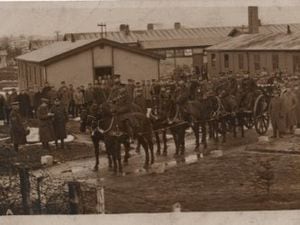1,700 people caught Covid on hospital wards in Black Country and Staffordshire
More than 1,700 people are believed to have contracted coronavirus in hospitals in the Black Country and Staffordshire, figures suggest.

The British Medical Association (BMA) said the NHS was already overstretched before the pandemic and warned bed capacity and staffing must be increased to control the spread of the virus in hospitals.
Analysis of NHS England data shows that, between August 1 and March 21, 656 people were thought to have been infected with coronavirus at the University Hospitals of North Midlands (UHNM) NHS Trust, while being treated in hospital for other conditions. The highest number of such transmissions was recorded in November alone, when 179 people were believed to have been infected in hospital.
UHNM cared for 3,990 coronavirus patients between that time frame – meaning 16 per cent are thought to have contracted the virus in hospital.
During the same time period, 342 people were thought to have been infected with Covid-19 at the Sandwell and West Birmingham Hospitals NHS Trust, while being treated for other conditions. The highest number of transmissions were recorded in January when 137 people were believed to have been infected. The trust cared for 3,000 Covid patients during that time frame – meaning 11 per cent are thought to have contracted the disease in hospital.
The data analysis shows 301 are believed to have caught the virus at the Walsall Healthcare NHS Trust while being treated in hospital – with the highest number of such transmissions recorded in January, when 116 people were believed to have been infected. The Walsall trust cared for 1,881 Covid-19 patients between August 1 and March 21 – meaning 16 per cent are thought to have contracted the disease in hospital.
There were thought to be 270 people infected with coronavirus while being treated at the Royal Wolverhampton NHS Trust for other conditions between those dates – with the highest number also recorded in January, where 107 were believed to have been infected. The trust cared for 2,722 Covid patients between those dates – meaning 10 per cent are thought to have contracted the virus in hospital.
And, between August 1 and March 21, 191 people were thought to have been infected with Covid at the Dudley Group NHS Foundation Trust, while being treated in hospital for other conditions. The highest number of transmissions were also in January, when 89 people were believed to have been infected. The trust cared for 2,746 Covid-19 patients between those dates – meaning seven per cent are thought to have contracted the disease in hospital.
Michelle Rhodes, UHNM chief nurse and director of infection prevention, said: “UHNM is one of the UK’s largest hospitals outside of London and since the beginning of the pandemic the safety of patients and staff has remained our top priority.
“Infection prevention measures were put in place to keep patients safe and to reduce the risk of transmission in hospital such as providing enhanced cleaning, increased education on the use of personal protective equipment, washing of hands and social distancing.
“We implemented plans to zone our hospitals in order to keep positive and non-Covid patients separate and all national infection prevention guidance such as wearing personal protective equipment, while on the wards has been followed at all times.
"Visiting has been restricted during the pandemic to keep patients and staff safe from the risk of spreading the infection.”
Diane Wake, chief executive at the Dudley Group NHS Foundation Trust, said: "Throughout the coronavirus pandemic, our staff have been very responsive to national guidance and take all measures to keep patients and staff safe and help prevent the spread of Covid.
"We have zoned the hospital to isolate patients with a positive Covid test and those waiting for test results. Patients who require surgery are tested for Covid prior to admission and require patients, except those who are exempt, to wear a surgical mask at all times unless sleeping and eating. Patients with a positive result are also asked not to leave isolation facilities.
"Our staff wear appropriate PPE at all times and wash hands regularly. All employees, both clinical and non-clinical, are required to wear fluid repellent surgical masks while on trust premises. They are also required to have a temperature check before each shift. Hand gel and masks are available for staff and public at all entrances."
Rob Harwood, chairman of the BMA consultants committee, said: "NHS staff have been working tirelessly under extraordinary conditions – there’s no doubt that the spread of the virus throughout hospitals will have only increased stress levels for both patients and staff."
He added that many doctors reported fearing catching the virus after seeing colleagues becoming seriously ill, and that ensuring staff and patients are protected would enable the NHS to tackle the backlog created during the pandemic.
An NHS spokesman said: "The ONS and other data conclusively demonstrate that the root cause of rising infection rates in hospitals is rising rates in the community.
"Since asymptomatic tests kits were made available for the first time by the Government’s Test and Trace programme in November, millions of staff have been tested helping to keep infections as low as possible, and all staff have been asked to rigorously follow Public Health England’s infection control guidance with hospital infection rates currently standing at around 4.2 per cent."





